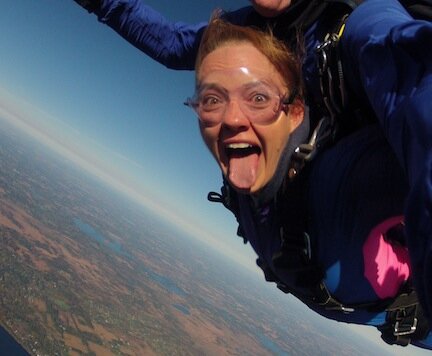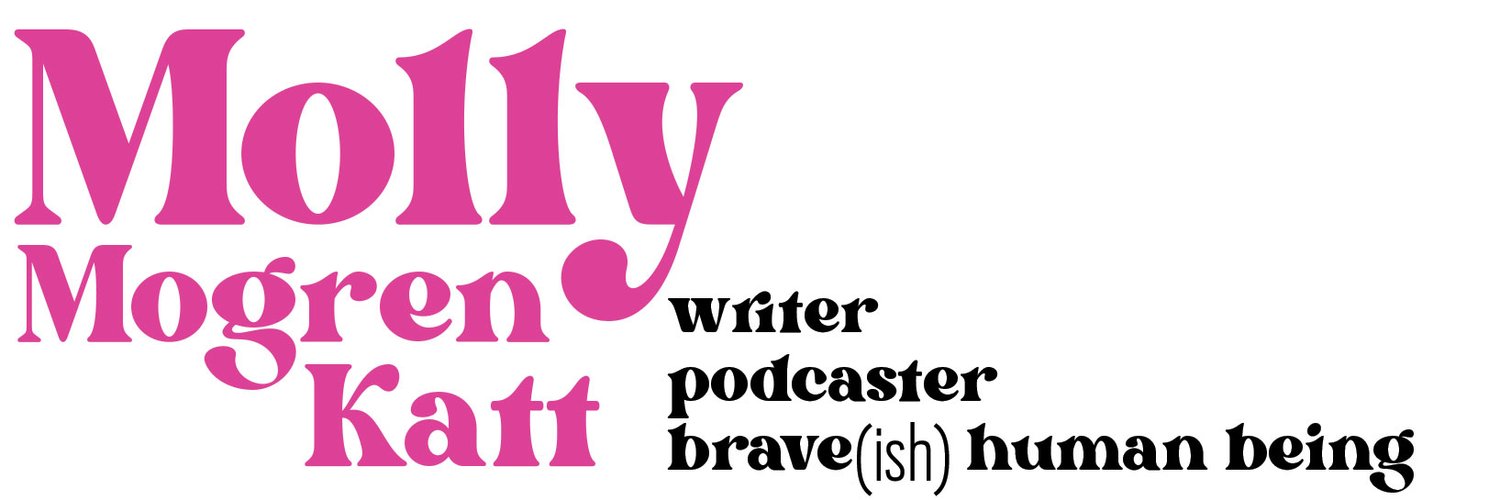Everyday Eleanor: I'm a Post-Abortion Wellness Coach
As a nutritionist and health coach, Jessica von Bergen loved helping women tackle their wellness goals. However, after having an abortion herself and speaking with other women who've terminated pregnancies, she identified a gap in care. Von Bergen opted to meld her health coaching business with post-abortion wellness-- something very few women have access to or even know about.So, what exactly is post-abortion care and why is it important? I'll let her explain.
* * *
You’re a nutritionist and health coach. What exactly does that mean? What inspired you to pursue wellness professionally?My nutrition education was heavily focused on the science of food and eating - things like calories, macros, and nutrient breakdown. But as soon as I started working with clients, I realised many of them had already tried following the science and still weren't able to create long-term changes within their bodies.Health coaches provide individualized support, motivation, and look at lifestyle and behaviour adjustments as a way to help clients achieve and maintain their wellness goals. The whole-person view of health coaching really appealed to me, and seemed like a natural addition to my existing nutrition practice.I added health coaching to my tool kit last year, and that's when I really started seeing some remarkable things happen. Health coaching has shifted my business from the old model of giving someone a prescribed protocol to the new model of helping guide people to make choices that work for them, with my nutrition expertise as support.
Your business relies largely on helping women identify the best way to fuel their body with great nutrition. However, you recently started offering a post-abortion wellness program. Why?
Women who have had abortions have almost no resources available to them. Every time I say that, it makes me angry and sad. Women are up at night relying on Google to give them answers, and the little that is available is either soft-focus angles or harsh and pseudo-scientific. There is information and access for those wanting therapy or counseling, thankfully, but nothing that provides these women with the help they need to feel like a powerful human again and get their bodies back on track.After my own abortion, I remember feeling like I had wrecked my body and had no idea how to put it back together. I was extremely fortunate to have had access to unbiased medical care, but everyone I spoke with was trained to help with the smaller picture of the procedure and short-term recovery. No one looked at the bigger picture of my life, body and hormones. I don't fault anyone for this, but it really illustrates a gap in women's health care.There's an important issue that nobody is talking about: what do you do to get your body back to normal after an abortion? What can we all do as health professionals that might contribute to well-rounded aftercare?You’ve said this program was inspired by your own abortion experience, where you felt you couldn’t even broach the subject with your family. Does your family know what you do? How did you get to the point where you felt confident enough to openly provide a service like this?My family are wonderful, open-minded, and tolerant people, and most of them would have been supportive. But at the time of my own abortion, there were so many emotions and everything in my life seemed so highly charged that I wanted as few people involved as possible.I've been working with nutrition and wellness clients for about five years, and for most of this time I've focused on women's health issues. I've never really talked about the specifics of my business with my family, and this is no different. My mum knows that I work with women who have had abortions. I have no problem talking with anyone about what it is that I do, but I'm aware that it's a bit of a delicate subject. At dinner parties, I tell people the same thing that I tell most of my family: that I'm a nutritionist and I work with women, and I focus on hormones and reproductive health.As far as confidence - I don't even feel like that comes into play here. When I realised that we're here in 2016 and there are barely more resources available to women than there were in 1996? That was my moment. That was my confidence. A friend referred to this kind of work as a calling, not a job, and that's exactly right. There's no way I can't do this.I’m sure your business has received lots of positive and negative feedback. Is working in a controversial field stressful to you? How do you handle it?When I started talking openly about helping women recover after abortions, I don't think I was quite prepared for the kinds of comments I would receive. I've heard so many stories about people's own experiences, and how they are grateful for the kind of work that I'm doing. I've also had some threats, which are obviously not pleasant, but seem to come with the territory. The trick is not to let either go to my head.The kind of work that I do can easily get heavy, but I wouldn't call it stressful. Doing insignificant work is far more stressful to me! To stay balanced I keep regular appointments with my own wellness team. I take care of my body by eating well and getting a decent amount of sleep and doing yoga, and I take care of my mind and spirit by reading and discovering new music and having fun with friends.How does abortion affect the body and mind short-term? Long-term?The short-term physical effects of an abortion are typically well explained by the medical professionals that work with a woman before, during, and immediately after the procedure. Soreness, tenderness, cramping, and bleeding are all normal to a certain degree and for a short time.Emotionally, the time leading up to the abortion is the most stressful time for a woman. Most states do have a requirement that women seeking abortion must receive counseling. Whether or not this was a requirement, I think it's beneficial for women to have the opportunity to articulate their feelings in a safe, unbiased space.Studies on the long-term physical effects of abortion show that there are no demonstrable links between abortion and any other health issues - no types of cancers, no fertility problems, nothing. If you look online, you'll see studies that claim that abortion is the cause of a multitude of health problems later in life, but official statements from the American Cancer Society and the American College of Obstetricians and Gynecologists prove this information to be false.There's no evidence of abortion having any negative long-term emotional impact. Again, this is based on numerous scientific studies. What these studies do provide is evidence that feelings of stigma and lack of social support create additional stress and negative psychological experiences for women, but not the abortion itself.From a physical standpoint, is there really any difference between having an abortion and a miscarriage?Miscarriage can be caused by a wide variety of factors, ranging from hormonal imbalance to structural abnormality to autoimmune conditions to chromosomal irregularities. There are internal physical factors as well as lifestyle factors that come into play. Regardless of the specific reason for miscarriage, there is something within the pregnancy that was a mismatch with the woman's body at that time (or vice versa), and did not allow for it to continue.Because abortion is entirely externally initiated (there needs to be outside intervention, whether by a pill or by a procedure), there are no chemical signals within the woman's body triggering an end to the pregnancy.After both miscarriage and abortion, women experience hormonal shifts beyond what they normally would as part of their regular cycles. Women who have had an abortion can be experiencing the same physical and emotional symptoms as women who have had a miscarriage, because these women are in the fundamentally similar situation of having their bodies pregnant and then suddenly not.So from a physical standpoint, the similarity is about equal to two women who are having their period: although mechanically what's happened is the same (the body is no longer pregnant), the hormonal nuances and the context of the situation and the emotion surrounding it can put them in a different place and lead them to both have radically different experiences.What’s your program like? How long does it take? What things do you tackle with clients?I put together the kind of program that I wished I had when I was trying to get my body back on track. It looks at the woman as an entire person, and how all the parts of her body are interconnected, and then works to address the root of any imbalances.I've always believed that food holds the solution to so many problems, so that's where my program starts. From there, we're able to explore some of the different ways that imbalances can show up in the body: unpredictable emotions, disrupted sleep patterns, changes to weight, skin breakouts, strange cravings, fluctuations in appetite, or irregular menstrual cycles.It's really important to me that as many women as possible are able to get their body, mind, and spirit back to normal after an abortion, and this drove my decision to work remotely rather than locally. There's also an extra element of privacy for my clients by allowing them to meet via Skype rather than having to show up at a local office. I don't want fear or intimidation to prevent women from getting the care that they need!My signature program is 12 weeks long, and it's important that we're covering three full menstrual cycles so we can see see changes happening and repeating through all the different phases. Private sessions happen every two weeks. Because this is a customized program I really let my clients guide what kind of support they need. Regardless of what we talk about, clients will leave each session with recommendations for how best to support their body until our next meeting. If there are any questions that come up, I'm accessible for support in between sessions via email.I'm also exploring the possibility of offering a less intensive version of the program, for women who aren't able to fully commit to 12 weeks or who find that the schedule doesn't work for them.I would assume a lot of women don’t seek help—medically or from friends and family—after an abortion because it’s still a taboo subject. In fact, I suspect many women think they don’t “deserve” help. What would you like to tell a woman who’s struggling with her post-abortion mind and body?It's going to be okay, and you're not alone.The World Health Organization tracks abortions and miscarriages together, and the annual number of these worldwide is more than 40 million - that's more than 125,000 women every single day who find themselves in a similar situation. You're not the only one in this place right now. I can assure you that many of these women feel shame, isolation, and confusion, and that many struggle through this without any support. It doesn't have to be that way.
* * *
Abortion is an extremely controversial subject. I encourage polite, articulate conversation, but inflammatory comments will be deleted.
Other posts about women's health? I've got 'em! How about what it's like to quit hormonal birth control? Plus, what I wish I'd known about miscarriage.
STUCK IN A RUT?
SIGN UP FOR ACCESS TO THE #HEYELEANORCHALLENGE!
(plus a FREE copy of 107 Ways to Expand Your Comfort Zone)




